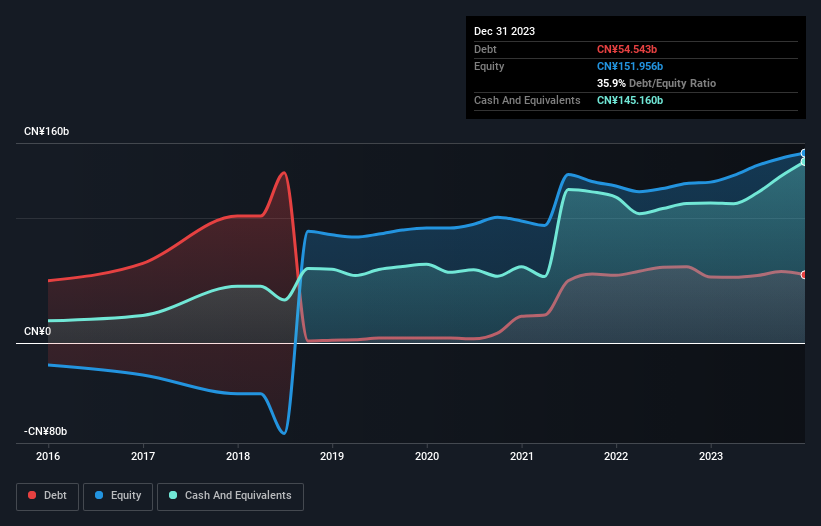
Legendary fund manager Li Lu (who Charlie Munger backed) once said, 'The biggest investment risk is not the volatility of prices, but whether you will suffer a permanent loss of capital.' It's only natural to consider a company's balance sheet when you examine how risky it is, since debt is often involved when a business collapses. Importantly, Meituan (HKG:3690) does carry debt. But is this debt a concern to shareholders?
When Is Debt A Problem?
Debt assists a business until the business has trouble paying it off, either with new capital or with free cash flow. Ultimately, if the company can't fulfill its legal obligations to repay debt, shareholders could walk away with nothing. However, a more frequent (but still costly) occurrence is where a company must issue shares at bargain-basement prices, permanently diluting shareholders, just to shore up its balance sheet. Of course, plenty of companies use debt to fund growth, without any negative consequences. When we examine debt levels, we first consider both cash and debt levels, together.
See our latest analysis for Meituan
What Is Meituan's Net Debt?
The chart below, which you can click on for greater detail, shows that Meituan had CN¥54.5b in debt in December 2023; about the same as the year before. But it also has CN¥145.2b in cash to offset that, meaning it has CN¥90.6b net cash.

How Healthy Is Meituan's Balance Sheet?
Zooming in on the latest balance sheet data, we can see that Meituan had liabilities of CN¥100.9b due within 12 months and liabilities of CN¥40.2b due beyond that. Offsetting these obligations, it had cash of CN¥145.2b as well as receivables valued at CN¥2.74b due within 12 months. So it can boast CN¥6.83b more liquid assets than total liabilities.
Having regard to Meituan's size, it seems that its liquid assets are well balanced with its total liabilities. So it's very unlikely that the CN¥532.6b company is short on cash, but still worth keeping an eye on the balance sheet. Simply put, the fact that Meituan has more cash than debt is arguably a good indication that it can manage its debt safely.
Although Meituan made a loss at the EBIT level, last year, it was also good to see that it generated CN¥9.0b in EBIT over the last twelve months. When analysing debt levels, the balance sheet is the obvious place to start. But ultimately the future profitability of the business will decide if Meituan can strengthen its balance sheet over time. So if you're focused on the future you can check out this free report showing analyst profit forecasts.
Finally, while the tax-man may adore accounting profits, lenders only accept cold hard cash. While Meituan has net cash on its balance sheet, it's still worth taking a look at its ability to convert earnings before interest and tax (EBIT) to free cash flow, to help us understand how quickly it is building (or eroding) that cash balance. Happily for any shareholders, Meituan actually produced more free cash flow than EBIT over the last year. That sort of strong cash generation warms our hearts like a puppy in a bumblebee suit.
Summing Up
While we empathize with investors who find debt concerning, you should keep in mind that Meituan has net cash of CN¥90.6b, as well as more liquid assets than liabilities. And it impressed us with free cash flow of CN¥41b, being 450% of its EBIT. So we don't think Meituan's use of debt is risky. When analysing debt levels, the balance sheet is the obvious place to start. However, not all investment risk resides within the balance sheet - far from it. To that end, you should be aware of the 1 warning sign we've spotted with Meituan .
Of course, if you're the type of investor who prefers buying stocks without the burden of debt, then don't hesitate to discover our exclusive list of net cash growth stocks, today.
New: Manage All Your Stock Portfolios in One Place
We've created the ultimate portfolio companion for stock investors, and it's free.
• Connect an unlimited number of Portfolios and see your total in one currency
• Be alerted to new Warning Signs or Risks via email or mobile
• Track the Fair Value of your stocks
Have feedback on this article? Concerned about the content? Get in touch with us directly. Alternatively, email editorial-team (at) simplywallst.com.
This article by Simply Wall St is general in nature. We provide commentary based on historical data and analyst forecasts only using an unbiased methodology and our articles are not intended to be financial advice. It does not constitute a recommendation to buy or sell any stock, and does not take account of your objectives, or your financial situation. We aim to bring you long-term focused analysis driven by fundamental data. Note that our analysis may not factor in the latest price-sensitive company announcements or qualitative material. Simply Wall St has no position in any stocks mentioned.
About SEHK:3690
Meituan
Operates as a technology retail company in the People’s Republic of China.
Solid track record with excellent balance sheet.

